

The Book of Dave. The Book of Dave is a 2006 novel by English author Will Self.
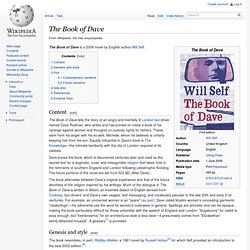
Content[edit] The Book of Dave tells the story of an angry and mentally ill London taxi driver named Dave Rudman, who writes and has printed on metal a book of his rantings against women and thoughts on custody rights for fathers. These stem from his anger with his ex-wife, Michelle, whom he believes is unfairly keeping him from his son. The Yearling.
The Yearling is the 1938 novel written by Marjorie Kinnan Rawlings.
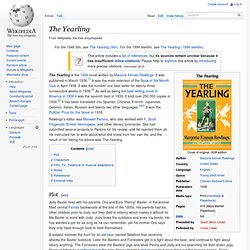
It was published in March 1938.[1] It was the main selection of the Book of the Month Club in April 1938. It was the number one best seller for twenty-three consecutive weeks in 1938.[2] As well as being the best-selling novel in America in 1938 it was the seventh best in 1939. It sold over 250,000 copies in 1938.[3] It has been translated into Spanish, Chinese, French, Japanese, German, Italian, Russian and twenty-two other languages.[4][5] It won the Pulitzer Prize for the Novel in 1939. Rawlings's editor was Maxwell Perkins, who also worked with F. Scott Fitzgerald, Ernest Hemingway, and other literary luminaries.
Of Human Bondage. Plot[edit] The book begins with the death of Helen Carey, the mother of nine-year-old Philip Carey.
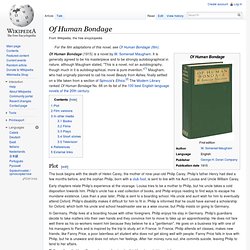
Philip's father Henry had died a few months before, and the orphan Philip, born with a club foot, is sent to live with his Aunt Louisa and Uncle William Carey. Early chapters relate Philip's experience at the vicarage. Louisa tries to be a mother to Philip, but his uncle takes a cold disposition towards him. Philip's uncle has a vast collection of books, and Philip enjoys reading to find ways to escape his mundane existence.
Darkness at Noon. Darkness at Noon (German: Sonnenfinsternis) is a novel by the Hungarian-born British novelist Arthur Koestler, first published in 1940.
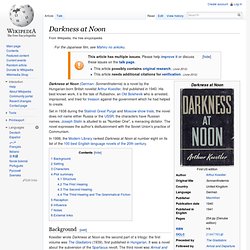
His best known work, it is the tale of Rubashov, an Old Bolshevik who is arrested, imprisoned, and tried for treason against the government which he had helped to create. Set in 1938 during the Stalinist Great Purge and Moscow show trials, the novel does not name either Russia or the USSR; the characters have Russian names. Joseph Stalin is alluded to as "Number One", a menacing dictator. Modern Library 100 Best Novels. Modern Library's 100 Best Novels is a list of the best English-language novels [1] of the 20th century as selected by the Modern Library, an American publishing company owned by Random House.
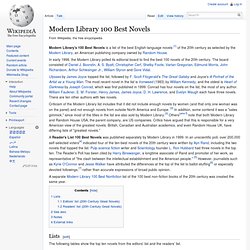
Criticism of the Modern Library list includes that it did not include enough novels by women (and that only one woman was on the panel) and not enough novels from outside North America and Europe. [2] In addition, some contend it was a "sales gimmick," since most of the titles in the list are also sold by Modern Library.[3] Others[who?] Note that both Modern Library and Random House USA, the parent company, are US companies. The Kite Runner. Cyberpunk derivatives. American author Bruce Bethke first coined the term "cyberpunk" in his 1980 short story of the same name, proposing it as a label for a new generation of punk teenagers inspired by the perceptions inherent to the Information Age.[1] The term was quickly appropriated as a label to be applied to the works of William Gibson, Bruce Sterling, John Shirley, Rudy Rucker, Michael Swanwick, Pat Cadigan, Lewis Shiner, Richard Kadrey, and others.
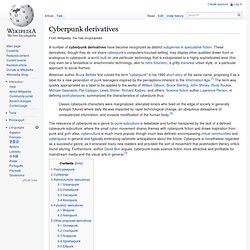
Science fiction author Lawrence Person, in defining postcyberpunk, summarized the characteristics of cyberpunk thus: Classic cyberpunk characters were marginalized, alienated loners who lived on the edge of society in generally dystopic futures where daily life was impacted by rapid technological change, an ubiquitous datasphere of computerized information, and invasive modification of the human body.[2] Postcyberpunk[edit] Cyberprep[edit] Bildungsroman. In literary criticism, a bildungsroman (German pronunciation: [ˈbɪldʊŋs.ʁoˌmaːn]; German: "novel of formation/education/culture"), [a] novel of formation, novel of education,[2] or coming-of-age story (though it may also be known as a subset of the coming-of-age story) is a literary genre that focuses on the psychological and moral growth of the protagonist from youth to adulthood (coming of age), and wherein character change therefore is extremely important.
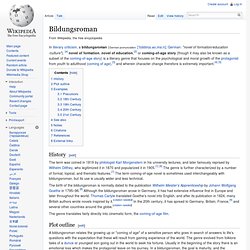
History[edit] The term was coined in 1819 by philologist Karl Morgenstern in his university lectures, and later famously reprised by Wilhelm Dilthey, who legitimized it in 1870 and popularized it in 1905. The genre is further characterized by a number of formal, topical, and thematic features.[7] The term coming-of-age novel is sometimes used interchangeably with bildungsroman, but its use is usually wider and less technical. Fatherland (novel) The story begins in Nazi Germany in April 1964, in the week leading up to Adolf Hitler's 75th birthday.
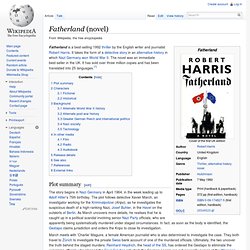
The plot follows detective Xavier March, an investigator working for the Kriminalpolizei (Kripo), as he investigates the suspicious death of a high-ranking Nazi, Josef Buhler, in the Havel on the outskirts of Berlin. As March uncovers more details, he realises that he is caught up in a political scandal involving senior Nazi Party officials, who are apparently being systematically murdered under staged circumstances. V for Vendetta. Publication history[edit] When the publishers cancelled Warrior in 1985 (with two completed issues unpublished due to the cancellation), several companies attempted to convince Moore and Lloyd to let them publish and complete the story.
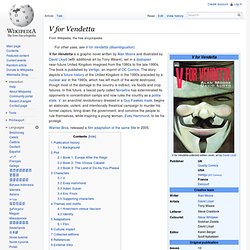
In 1988, DC Comics published a ten-issue series that reprinted the Warrior stories in colour, then continued the series to completion. The first new material appeared in issue No. 7, which included the unpublished episodes that would have appeared in Warrior No. 27 and No. 28. Tony Weare drew one chapter ("Vincent") and contributed additional art to two others ("Valerie" and "The Vacation"); Steve Whitaker and Siobhan Dodds worked as colourists on the entire series. Background[edit] David Lloyd's paintings for V for Vendetta in Warrior originally appeared in black-and-white.
Flow My Tears, the Policeman Said. Flow My Tears, The Policeman Said (called The Android Cried Me a River in VALIS) is a 1974 science fiction novel by Philip K.
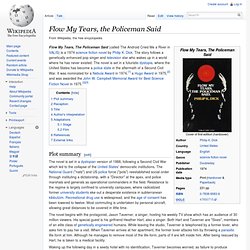
Dick. The story follows a genetically enhanced pop singer and television star who wakes up in a world where he has never existed. The novel is set in a futuristic dystopia, where the United States has become a police state in the aftermath of a Second Civil War. It was nominated for a Nebula Award in 1974,[1] a Hugo Award in 1975,[2] and was awarded the John W. Campbell Memorial Award for Best Science Fiction Novel in 1975.[2][3] The Chrysalids. The novel was adapted for BBC radio by Barbara Clegg in 1982,[5] with a further adaptation by Jane Rogers in 2012.[6] It was also adapted for the theatre by playwright David Harrower in 1999.[7] Plot summary[edit] A few thousand years in the future, post-apocalypse rural Labrador has become a warmer and more hospitable place than it is at present.
The inhabitants of Labrador have vague historical recollections of the "Old People", a technologically advanced civilisation which existed long ago and which they believe was destroyed when God sent "Tribulation" to the world to punish their forebears' sins. Anthem (novella) Equality 7-2521 is described as "six feet tall, 21 year old male". According to The New Ayn Rand Companion, Equality 7-2521 experiments with electricity to become a literal and figurative bringer of light, similar to Prometheus.[1] He is named "The Unconquered" by Liberty 5-3000, and also named himself Prometheus. Liberty 5-3000 is the love interest of Equality 7-2521.
She is described as being "brave and single-minded. Panopticon. The Panopticon is a type of institutional building designed by the English philosopher and social theorist Jeremy Bentham in the late 18th century. The concept of the design is to allow a single watchman to observe (-opticon) all (pan-) inmates of an institution without them being able to tell whether they are being watched or not. Although it is physically impossible for the single watchman to observe all cells at once, the fact that the inmates cannot know when they are being watched means that all inmates must act as though they are watched at all times, effectively controlling their own behaviour constantly.
The name is also a reference to Panoptes from Greek mythology; he was a giant with a hundred eyes and thus was known to be a very effective watchman. Never Let Me Go. Never Let Me Go may refer to: Schillers Leben: verfat︣ aus ... Lexikon Schiller-Zitate: aus Werk ... That Face. Plot[edit] Mia is at boarding school and has access to her mother's drugs. She gets into trouble for drugging a fellow student and this causes her father to be brought back to England from Hong Kong. Henry, her brother, has dropped out of school and has to stay at home and look after his alcoholic mother. Martha, their fading glamorous mother, controls their lives whilst her own sick mind and world crumble around her.
Original West End production[edit] 2010 New York production[edit] Project Gutenberg - free ebooks online download for iPad, Kindle, Nook, Android, iPhone, iPod Touch, Sony Reader. The Women's Room - Download free podcast episodes by Rowan Radio on iTunes. On the Go-Casts - Your source for all Rowan Podcasts. A locally produced show focusing on issues of concern to women. Airs Thursdays at 5:00 p.m. Recent Podcasts The most recent podcasts are shown here. To access older podcasts, you will need to subscribe using a podcast client such as Juice or iTunes . Free eBooks at Planet eBook - Classic Novels and Literature.
Free Classic Books Online at Classic Reader. Tom Rob Smith: Kind 44. Top 25 Best Fantasy Books. The Wheel of Time turns and Ages come and go, leaving memories that become legend. Legend fades to myth, and even myth is long forgotten when the Age that gave it birth returns again.